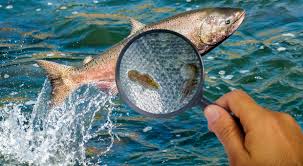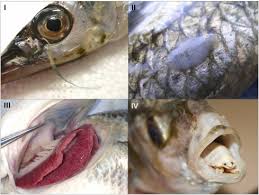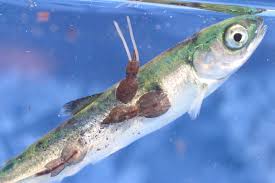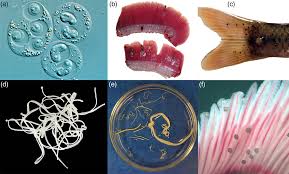Emerging infectious diseases are linked to pathogens that have recently increased in incidence, geographic range, or host range. These diseases often pose a greater threat to biodiversity, leading to biomass loss and extinctions of host species, compared to endemic diseases.
This is because host-parasite interactions differ when the pathogen has not co-evolved with the host or its new ecosystem. When parasitic fauna are introduced alongside a host species into a new region, an outbreak may occur due to the absence of co-evolution between the new host and the pathogen. The lack of co-evolution often results in higher transmission rates and greater infection impacts.
Host Responses to Parasite Infection in Fish Populations
Host responses to parasite infections play a crucial role in population dynamics. In co-evolved host-parasite relationships, infections generally reduce the fitness of the host and affect the dynamics of fish populations.
The costs of infection can be offset by the host’s immune system, which acts as a barrier and can also result in alterations to life-history traits, particularly in the pre-reproductive phase.
This can impact reproduction, growth, and survival as the host reallocates resources to ensure reproduction before resource depletion or death. In cases where fish are exposed to newly introduced pathogens, the outcomes may be catastrophic, leading to a strong negative effect on host survivorship.
Read Also: Vanda Orchid Flowers: All You Need To Know About
Impact of Fish Movement on Disease Emergence in Aquaculture

In freshwater ecosystems, the introduction of non-native fish species through aquaculture has significantly increased the opportunity for fish parasites to spread between regions. The rate of fish introductions has doubled over the last 30 years due to the globalization of aquaculture.
Introduced diseases from fish movements have caused significant impacts, such as the infection of European eel (Anguilla anguilla) with Anguillicoloides crassus, which has contributed to their global decline. Research has often focused on the immediate effects of parasite-induced mortality, while sub-lethal impacts, such as changes in host behavior and growth rates, are rarely studied, despite their potential consequences for wild populations.
Role of Parasites in Aquatic Ecosystems
Parasites are widespread and exist in every living organism, forming an essential part of ecosystems. Their presence in aquatic organisms is typically in equilibrium, as parasitism is the most common lifestyle on the planet. Researchers often refer to control sites as pathogen- or disease-free, but this generally refers to the absence of viruses, bacteria, and xenobiotics, not parasites.
Environmental or anthropogenic changes can disrupt the balance between host and parasite, resulting in disease. Such changes can lead to mechanical, physiological, or reproductive damage to the host. Parasites also play an important role in defining an ecosystem by revealing the role of the fish host within the food web.
Mechanical Damage Caused by Parasites

1. Fusion of Gill Lamellae: Many species of parasites invade the gills of fish, ranging from microscopic tubulinea or monogenea to larger annelida and arthropoda. These parasites can cause non-critical reactions, such as mild discoloration of the gill filaments, or critical conditions involving heavy erosion, increased mucus secretion, and respiratory distress.
2. Tissue Replacement: Parasite loads can become so high that they occupy a significant portion of a specific organ in the fish, replacing normal tissue and impairing organ function.
Physiological Damage Caused by Parasites
1. Cell Proliferation: The uncontrolled proliferation of certain cell types in response to parasites can be detrimental to the fish, similar to how cell proliferation in humans leads to diseases like cancer.
2. Immunomodulation: Parasites have evolved strategies to evade the host’s immune response, while the host has developed counter-strategies. This balance is essential to the parasite’s survival but can provoke illness in the host. Some parasites even manipulate the host’s immune system to aid in their attachment and long-term survival.
3. Detrimental Behavioral Responses: Parasites can alter their host’s behavior, particularly in cases where they rely on intermediate hosts for transmission. For instance, arthropods infested by acanthocephalan parasites may exhibit changes in activity, escape behavior, or substrate choice, which could make them more vulnerable to predation.
Altered Growth Due to Parasitism
Altered growth, such as stunted development, can occur in fish due to parasitic infestations. However, this is more frequently observed under extreme laboratory conditions rather than in the wild.
Parasites depend on the host’s energy for growth, and their impact is influenced by the host’s ability to acquire nutrients. Research has shown that faster-growing fish tend to harbor larger parasites, indicating that parasite growth is also tied to the host’s growth rate.
Read Also: Find out which of the Ruminant Breeds is better to raise
Reproductive Damage from Parasites

Parasites can affect fish reproduction by directly using the host’s energy and nutrients or by triggering an immune response, which diverts resources away from reproduction. These impacts can lead to reduced reproductive success, which, in turn, affects fish populations in aquaculture systems.
Overall Impact of Parasites on Fish Health
Parasites cause a range of mechanical, physiological, and reproductive damages to their fish hosts. These changes can reduce growth rates, fecundity, and survival, as well as alter behavior and sexual characteristics.
The consequences of parasitic infections extend beyond individual fish to affect populations, communities, and ecosystems. In aquaculture, these effects can significantly impact fish production, quality, and the overall sustainability of fish farming operations.
Do you have any questions, suggestions, or contributions? If so, please feel free to use the comment box below to share your thoughts. We also encourage you to kindly share this information with others who might benefit from it. Since we can’t reach everyone at once, we truly appreciate your help in spreading the word. Thank you so much for your support and for sharing!
Read Also: Unleashing the Power of Tech Startup Marketing
Frequently Asked Questions
We will update this section soon.

